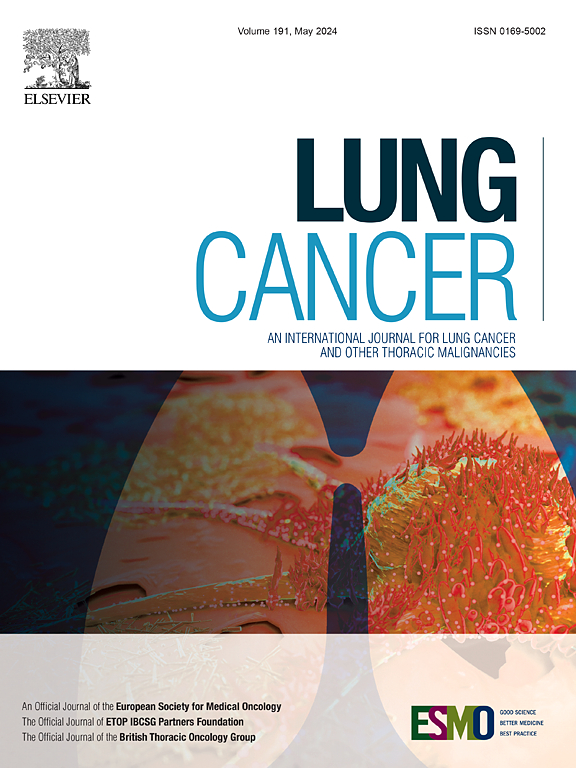接受免疫检查点抑制剂治疗的非小细胞肺癌患者血糖水平升高与生存率降低之间的关系。
IF 4.4
2区 医学
Q1 ONCOLOGY
引用次数: 0
摘要
背景:肥胖和高胆固醇血症与NSCLC患者对ICIs较好的反应有关,而2型糖尿病(T2D)与较差的反应有关。然而,血糖水平与疗效之间的关系仍然未知。本研究调查了接受 ICI 治疗的 NSCLC 患者的平均基线血糖水平、T2D、血脂异常和肥胖对总生存期(OS)的影响:利用三个医疗中心的数据开展了一项多中心回顾性队列研究,研究对象为接受 ICI 治疗的局部晚期或转移性 NSCLC 患者,无论其接受哪种治疗或同时接受哪种治疗。研究人员对开始接受 ICI 治疗前 4 周内的随机静脉血糖水平、体重指数、血脂异常史、T2D 以及 OS 进行了评估。BMI小于18.5的患者被排除在外:在438名患者中,基线血糖水平最高四分位数患者的OS明显短于最低四分位数患者(HR,1.53;95 % CI,1.08 - 2.15;P值= 0.016)。在调整类固醇使用、糖尿病、表现状态和降糖药物使用等因素后,这种相关性保持一致。在接受 ICI 单药治疗和 PD-L1 TPS ≥ 1 % 的患者子集中,这些效应被一致观察到:结论:在接受 ICIs 治疗的 NSCLC 患者中,较高的平均基线血糖水平与较短的生存期相关。单个代谢综合征成分对 NSCLC 患者 ICI 反应的不同影响凸显了代谢对治疗结果影响的复杂性。本文章由计算机程序翻译,如有差异,请以英文原文为准。
Association between higher glucose levels and reduced survival in patients with non-small cell lung cancer treated with immune checkpoint inhibitors
Background
Obesity and hypercholesterolemia have been associated with better responses to ICIs in NSCLC, while type 2 diabetes (T2D) has been associated with a worse response. However, the association between glucose levels and outcomes remains unknown. This study investigated the impact of mean baseline glucose levels, T2D, dyslipidemia, and obesity on overall survival (OS) in NSCLC patients undergoing ICI therapy.
Methods
A multicenter retrospective cohort study was conducted using data from three medical centers, with locally advanced or metastatic NSCLC patients receiving ICI, regardless of treatment line or concurrent therapy. Random venous glucose levels within 4 weeks prior to ICI initiation, BMI, history of dyslipidemia, and T2D, along with OS, were assessed. Patients with BMI < 18.5 were excluded.
Results
Among 438 patients, those with the highest quartile of baseline glucose levels had significantly shorter OS compared to those in the lowest quartile (HR, 1.53; 95 % CI, 1.08 – 2.15; p-value = 0.016). This association remind consistent after adjusting for steroid use, diabetes, performance status and glucose-lowering medication use. These effects were consistently observed in subsets of patients treated with ICI monotherapy and with PD-L1 TPS ≥ 1 %.
Conclusion
Higher mean baseline glucose levels correlated with shorter survival in patients with NSCLC treated with ICIs. The divergent effects of individual metabolic syndrome components on ICI response in patients with NSCLC underscore the complexity of metabolic influences on treatment outcomes.
求助全文
通过发布文献求助,成功后即可免费获取论文全文。
去求助
来源期刊

Lung Cancer
医学-呼吸系统
CiteScore
9.40
自引率
3.80%
发文量
407
审稿时长
25 days
期刊介绍:
Lung Cancer is an international publication covering the clinical, translational and basic science of malignancies of the lung and chest region.Original research articles, early reports, review articles, editorials and correspondence covering the prevention, epidemiology and etiology, basic biology, pathology, clinical assessment, surgery, chemotherapy, radiotherapy, combined treatment modalities, other treatment modalities and outcomes of lung cancer are welcome.
 求助内容:
求助内容: 应助结果提醒方式:
应助结果提醒方式:


